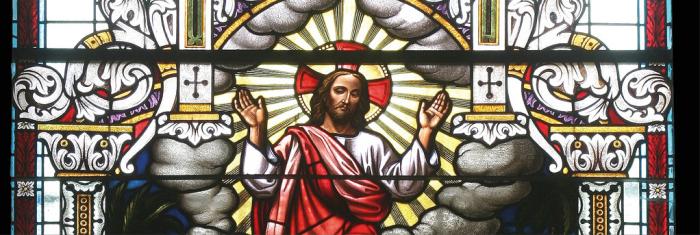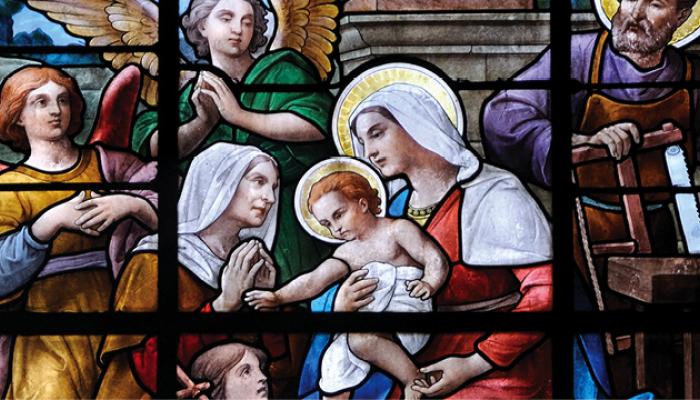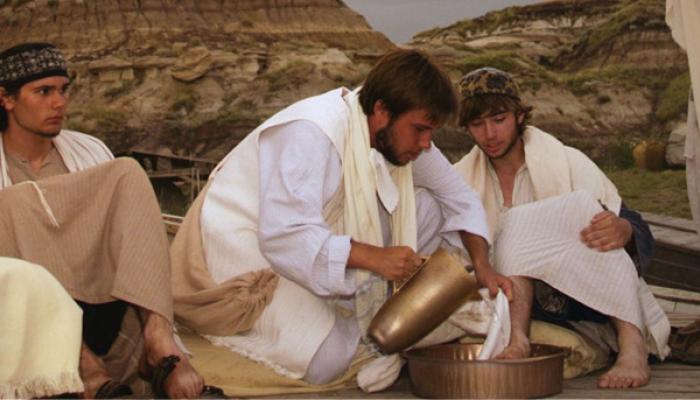
3.34 Quando celebriamo Ascensione e Pentecoste?
Dopo la sua risurrezione alla Domenica di Pasqua, Gesù apparve ai discepoli in un periodo di quaranta giorni. Parlò loro di Dio e del futuro che aveva preparato per noi: il Regno di Dio (At 1, 3)At 1, 3: Egli si mostrò a essi vivo, dopo la sua passione, con molte prove, durante quaranta giorni, apparendo loro e parlando delle cose riguardanti il regno di Dio.. Quaranta giorni dopo la Domenica di Pasqua, noi commemoriamo l’ascesa di Gesù al cielo, o 'Ascensione'.
I suoi discepoli passarono i giorni dopo l’Ascensione in preghiera (At 1, 14)At 1, 14: Tutti questi erano perseveranti e concordi nella preghiera, insieme ad alcune donne e a Maria, la madre di Gesù, e ai fratelli di lui.. Proprio come noi, attendevano l’arrivo del Consolatore, lo Spirito Santo che Gesù aveva promesso (Gv 17, 7Gv 17, 7: Ora essi sanno che tutte le cose che mi hai dato vengono da te., At 1, 9-11At 1, 9-11: Detto questo, mentre lo guardavano, fu elevato in alto e una nube lo sottrasse ai loro occhi. Essi stavano fissando il cielo mentre egli se ne andava, quand'ecco due uomini in bianche vesti si presentarono a loro e dissero: "Uomini di Galilea, perché state a guardare il cielo? Questo Gesù, che di mezzo a voi è stato assunto in cielo, verrà allo stesso modo in cui l'avete visto andare in cielo."). Pentecoste è il cinquantesimo giorno dopo Pasqua. È il giorno in cui celebriamo l’ingresso dello Spirito Santo nella vita dei cristiani. Gli Apostoli erano così colmi di Spirito Santo, che si sentirono spinti a proclamare il Vangelo di Gesù.
What does it mean to say that Jesus ascended into heaven?
With Jesus, one of us has arrived home with God and remains there forever. In his Son, God is close to us men in a human way. Moreover, Jesus says in the Gospel of John, “And I, when I am lifted up from the earth, will draw all men to myself” (Jn 12:32).
In the New Testament, the Ascension of Christ marks the end of forty days during which the risen Lord was especially close to his disciples. At the end of this time, Christ, together with his whole humanity, enters into the glory of God. Sacred Scripture expresses this through the images of “cloud” and “heaven” or sky. “Man”, says Pope Benedict XVI, “finds room in God.” Jesus Christ is now with the Father, and from there he will come one day “to judge the living and the dead”. Christ’s Ascension into heaven means that Jesus is no longer visible on earth yet is still present. [Youcat 109]
What happened on Pentecost?
Fifty days after his Resurrection, the Lord sent the Holy Spirit down from heaven upon his disciples. The age of the Church began.
On Pentecost the Holy Spirit transformed fearful apostles into courageous witnesses to Christ. In a very short time, thousands had themselves baptized: it was the birthday of the Church. The miracle of the languages on Pentecost shows that the Church is there for all peoples from the very beginning: She is universal (= the Latin term for the Greek kat’ holon, catholic) and missionary. She speaks to all men, overcomes ethnic and linguistic barriers, and can be understood by all. To this day the Holy Spirit is the “soul” of the Church, the essential principle of her life. [Youcat 118]
“As the Father has sent me, even so I send you... Receive the Holy Spirit” (Jn 20:21-22); this is what Jesus says to us. The gift of the Spirit on the evening of the Resurrection took place once again on the day of Pentecost, intensified this time by extraordinary outward signs... like a wind which shook the place the Apostles were in, filling their minds and hearts. They received a new strength so great that they were able to proclaim Christ’s Resurrection in different languages. [Pope Francis, Homily on Pentecost, 24 May 2015]





